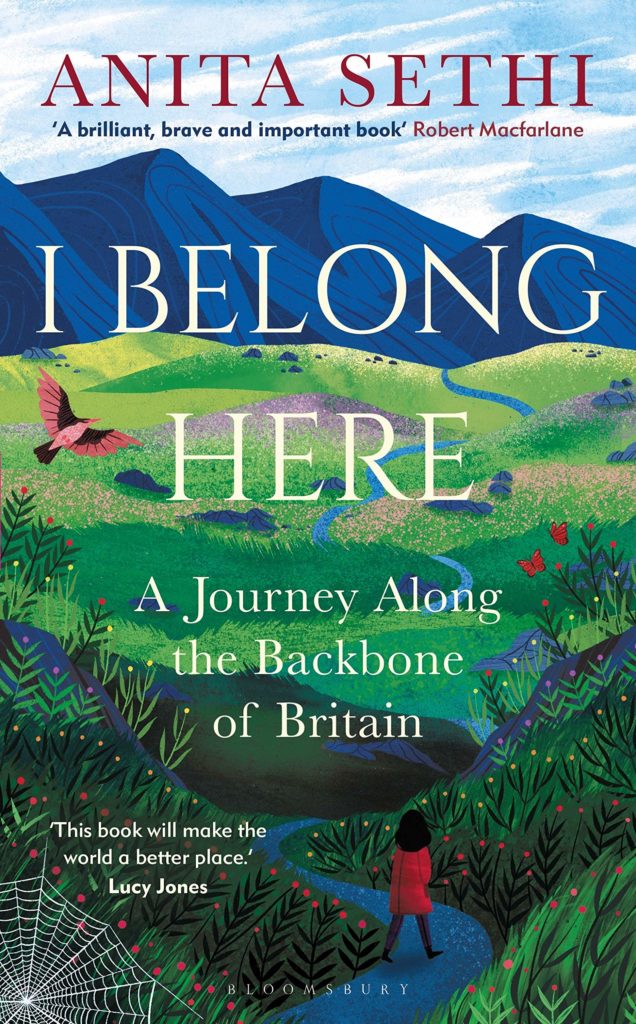Ameena Rojee reviews Anita Sethi’s debut; a journey of reclamation through Britain’s natural landscapes.

I glance at the cover of Anita Sethi’s book I Belong Here, waiting for the perfect moment to open the book for the first time. I pick it up several times. It’s lush and velvety soft in my hands, and I’m enthralled by the gorgeous cover. In it, a brown-skinned woman follows a winding path leading into mysterious blue mountains, wild and exciting.
I feel a tight knot in my stomach every time I look at it though, and I’m apprehensive. I know that with 100% certainty that the words will echo experiences and traumas not entirely different to my own, some that are fresh, moments that I’ve avoided reliving in any way, that I don’t really want to relive now.
But this book is important. It’s a momentous occasion for me; a woman of colour with immigrant parents brought up in south London, but always wild at heart, a lover of nature and adventure and the outdoors, with a recently-developed passion for long-distance walking. I realise that it’s the first time I’m reading a book about a woman of colour who goes adventuring into the wild.
In I Belong Here, Sethi brings together so many different areas of exploration: nature writing, cultural, racial and natural history, geography, death, grief, identity, racism, classism, trauma, the concept of belonging, tied together throughout by her exploration of language, words, and their power – the violent, abusive power of words and also how they contain the power to heal.
While on a TransPennine Express train from Liverpool on the way to Newcastle for work, a journey which passes through her home, she experiences a horrific racial hate crime. ‘Get back on the banana boat’, the man spits out.
Trauma sticks. It comes back again and again in the form of anxiety, stress, panic attacks, depression and more. Stifling anxiety and claustrophobia after the attack causes Sethi to feel a longing for the great outdoors and a desire not to let her experience stop her from travelling freely, and so she sets out to reclaim her land, to walk through the world and assert her right to exist.
She chooses to walk along the Pennine Way, the very first national trail in England, also known as the “backbone of Britain” — a trail which encompasses the place she knows as home.
I Belong Here is an education in so many ways, and Sethi often prompts me to look back to my own cultural history. Like Sethi, I do not fit neatly into one box. Asian, African, European, British — it’s a mixed heritage that makes me feel deeply connected to the world and simultaneously that I don’t belong in any one part of it. ‘I don’t remember being taught anything about why I — a brown-skinned girl — was sitting in a classroom in northern England.’ I see myself reflected with almost exact precision in the entire book.
She entwines each theme beautifully, a flowing structure placed into sections titled Mouth, Skin, Backbone, Lifeblood, Feet, reflecting Sethi’s view that we are not separate from nature, that we are all part of nature itself – through the air we breathe (or the breath that is taken away from us), the organic matter that lives within our bodies themselves, the very fact that we cannot exist without nature.
Her words come through like an epic verse, telling us about her incredible experiences across ancient landscapes of the North steeped in deep time, moments of pure wild joy, moments which tap into a more altogether primal way of being.
She writes relatably, and what she does feels achievable. There is no pretense; she writes matter-of-factly when she doesn’t know the name of a bird, tree, plant, and doesn’t avoid speaking on times when she feels like giving up, the lows as well as the highs, and it’s this that lets us walk in her footsteps with ease and empathy.
Towards the end of the book she says ‘I have been hugged by the wind, embraced by the light itself, by the curve of the earth…’ and I too feel hugged by the wind and embraced by the earth through Sethi’s honest, moving, sometimes hard-to-read but crucial writing.
I didn’t notice how unmoored I am until I read this book — so sure I’d gotten away without much of a hit on my mental health this past year and a half. Sethi’s words settled over me like a calming blanket, instilling hope I hadn’t noticed was missing, filling gaps in my own history, and increasing tenfold a desire to head back into nature; a need to soften the sharp edges of this strange trauma we’ve collectively experienced and spend some time remembering how it feels to fully inhabit myself.
*
‘I Belong Here’ is out now and available here, published by Bloomsbury.
Ameena Rojee is a writer and photographer who enjoys telling stories about adventure, the outdoors, and our relationship with the natural world. She’s also the editor of Black River Journal. Visit her website here / follow her on Twitter here.